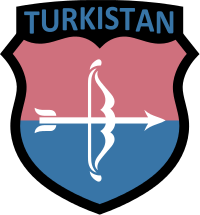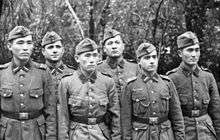Turkestan legion

The Turkestan Legion (German: Turkistanische Legion) was the name for the military units composed of the Turkic peoples who fought in the German Army during World War II. Most of these troops were Red Army POWs who formed common cause with other Turkic, Caucasian, Cossack, and Crimean collaborationism with the Axis powers. Its establishment was spearheaded by Nuri Killigil, a Turkish theorist of Pan-Turkism, which sought to separate territories inhabited by Turkic peoples from their countries and eventually unite them under Turkish rule.
Although Turkic peoples had been perceived initially as "racially inferior", this attitude officially already changed in the Autumn 1941, when the Nazis attempted to harness the anti-Russian sentiment of Turkic peoples in Russia for political gain. The first "Turkistan Legion" was mobilized in May 1942, originally consisting of only one battalion but having been expanded to 16 battalions and 16,000 soldiers by 1943. Under the Wehrmacht's command, these units were mobilized exclusively on the Western front, isolating them from the Red Army, on the war fronts of France and north Italy.
The battalions of the Turkistani Legion formed part of the 162nd Infantry Division and saw much action in Axis-occupied Yugoslavia (especially modern-day Croatia) and Italy. Much of the Turkestan Legion was ultimately imprisoned by British forces and repatriated into Russia, where they would face prison terms from the Soviet government for having collaborated with the Nazis. Notable members of the legion include Baymirza Hayit, a Turkologist who after the war, settled in West Germany and became an advocate for Pan-Turkist political causes.

See also
References
- Flagmaster Nr. 105, Summer 2002, Publikation von „The Flag Institute“, Mayfair, London, W1J5NS, United Kingdom
Further reading
- Sakal, Halil Burak (2013). Başka Bir Dünya Savaşı: İkinci Dünya Savaşı Sırasında Almanya Tarafında Savaşan Türkistanlılar. Ötüken. ISBN 978-975-437-981-5.
